 |
|||||
 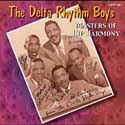 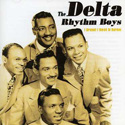 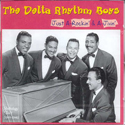 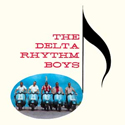 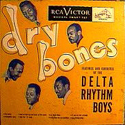 |
|||||
| The Delta Rhythm Boys (Inducted 1999) Quick: Which singers performed in more motion pictures than any other group in history? The Beatles? Wrong. THE MILLS BROTHERS? Wrong again. The Delta Rhythm Boys appeared in 15 films from the early ‘40s to 1956. But this was only one of the many achievements of the pioneering rhythm and blues group. If their name doesn’t have the same familiar sign as THE INK SPOTS or Mills Brothers it’s because their 50-year career yielded only one chart hit. But in terms of singing, they were a hit every time out and became popular through the media of radio, live performances, films, and even Broadway shows. Their story begins at Langston University in Oklahoma. Second-year student Lee Gaines had been chosen by school president Dr. Isaac Young to form a university quartet. Lee, a sousaphone player who had led his freshman vocal quartet to a first prize in class competition, recruited first tenor Elmaurice Miller, second tenor Traverse Crawford, and baritone Essie Atkins while keeping himself on bass. The group arranged to transfer to Dillard University of New Orleans after meeting Dr. Horace Mann Bond (father of politician Julian Bond), who got the boys excited about the new music program he was assembling at Dillard as its new dean. In their haste, the group arrived at Dillard a week before classes and had to move furniture and clean floors in order to settle in at the dorm ahead of time. During the school year, the tutelage of Professor Fredrick Hall and the various concerts at the college and in New Orleans sharpened the group’s harmonies on their repertoire of folk songs, spirituals, and Mills Brothers pop. On a tour of Southern universities, the group was so well received that when they returned to school they were informed that their tuition fees and costs had been absorbed by the college, in effect granting them full scholarships. They would never get to use those scholarships fully, however; they met a radio personality from Buenos Aires who was in New Orleans for Mardi Gras to find an act for Argentine radio. When he came to the college and heard the Fredrick Hall Quartet (they had named themselves after their musical mentor), Senor Adolpho Avaliz asked Dr. Hall if the group’s services could be acquired for several months. The Doctor agreed they could go when school ended and kept the secret until the quartet’s last appearance of the school year. In the summer of 1936 the Quartet made their first professional appearance a continent away from home, performing in Buenos Aires and singing weekdays on Argentina Radio Splendid. A three-month stay turned into seven months of radio works, musical theatre, and performances in Peru and Chile. Having already missed half the school year, the group decided to take their career further by moving to New York. They took up residence on 138th Street and 7th Avenue in Harlem in the house where composer Eubie Blake was living. Blake heard the group rehearsing and tipped the boys to an audition for the Broadway show Sing Out the News, and integrated play requiring a black vocal group. The quartet won the audition over such luminaries as the DEEP RIVER BOYS and THE CHARIOTEERS. By now they were calling themselves the Delta Rhythm Boys. For the next few years their reputations grew through their 15-minutes-a-day radio show on CBS and other Broadway shows such as Hellzapoppin’ and Mike Todd’s The Hot Mikado starring Bill “Bojangles” Robinson. In 1939 the group met Paul Kapp (brother of Decca Records exec Dave Kapp), and their lengthy recording career began with the recording on December 16, 1940, of four songs for that label. The first two songs, “Chilly and Cold”/”Gimmie Some Skin,” were released in March 1940. Meanwhile, they kept up a whirlwind of performance activity, which culminated in a film contract with Universal Pictures. The early ‘40s saw a new look for the Delta Rhythm Boys: Clinton Holland took over first tenor and was replaced shortly thereafter by Carl Jones; Essie Atkins was replaced by Kelsey Pharr on baritone. Their multifaceted career continued. In 1942, they began playing Las Vegas (when it only had two hotels). They spent two years singing on the “Amos and Andy” radio show. By the beginning of 1945 they’d already recorded 20 singles (including five with Mildred Bailey and two with Fred Astaire) and appeared in 11 Universal films and shorts including Weekend Pass and Follow the Boys. In June of 1945 Decca released the first of their sides done with Ella Fitzgerald, “It’s Only a Paper Moon”/”Cry You Our of My Heart.” “Paper Moon” was a particularly fine shuffle-beat smoothie that had Ell and the boys trading leads. In December of 1945 the Delta Rhythm Boys’ 23rd 78 hit the market. “Just A-Sittin and A-Rockin” rose to number 17 on the pop charts their first (and only) chart success. In 1947, they signed with RCA Records, and among the many classic sides released on the label was the spiritual “Dry Bones” (done with the half-step modulations that the group had used in auditions as far back as 1937) and an arrangement of Duke Ellington’s “Take the ‘A’ Train.” If you wonder when the vocalese style (that groups like Manhattan Transfer used) started, it was most likely with this recording. Another nifty RCA release was the bouncy bass-led “Ain’t Gonna Worry ‘Bout a Soul.” The group’s success and diversified career can be attributed not just to their talent but also to their training, since the members could both write arrangements and read music. In March of 1949 the Deltas recorded under the name the Four Sharps for Atlantic. Victor began reissuing several of their 78s on 45 rpm in April 1949, and Decca continued to record and release Rhythm Boys product. Still, they managed to back on Atlantic and even recorded under their own name for that label in late 1949 with another bass-led ballad, “Sweetheart of Mine.” Possibly their best Atlantic effort was the jazz-tinged “If You See Tears in My Eyes” of March 1950. In 1949, the Deltas made their first trip to Europe, performing in Stockholm and then London. They went on to record numerous Swedish folk songs in Swedish (for Metronome Records in Stockholm) and Finnish folk tunes in Finnish. During a 1956 trip to Montreal, the group had an impromptu backstage visit from Albert Tavel of the French agency Tavel and Marouani. He managed to lure the group to Paris for a New Year’s Eve show at the Moulin Rouge; it turned into a nine month engagement. The “vedettes Americaines” (American stars) became so popular that they signed to record with the French Barclay Records in 1957 and Vega Records in 1958. In 1960, Kelsey Pharr died in Honolulu after a trip to Japan. Soon after, Carl Jones left to have more time with his family and was replaced by first tenor Herb Coleman. Hugh Bryant replaced Kelsey. With the American music scene changing rapidly, the Deltas found their appeal diminishing. Overseas they were royally received, however, so in the early 1960s the group made Paris their home base for years of European performances. In 1974, Herb Coleman was shot in Paris and died in the arms of Lee Gaines. Original Delta member Traverse Crawford died in the following year. By 1979, the lineup was Gaines, Bryant, Walter Trammell on first tenor, and Ray Beauty on second tenor. The group had been together more than 50 years when founder Lee Gaines died on July 15th, 1987, in his home of only one year, Helsinki, Finland. In a bizarre scenario that brought the group more attention in America than it had received in more than 30 years, Hugh Bryant sang at Lee Gaines’ funeral and upon completing the song died on the spot. Though not as well-known as some other groups in America, the Rhythm Boys’ musical impact is undeniable. Jimmy Ricks, the legendary bass of THE RAVENS, chose a singing career due to his being enamored with Lee Gaines’ singing. The Mills Brothers readily acknowledged them as their favorite group.
~ Jay Warner Soundtrack - Filmography |
|||||
|
|||||
| Discography - A Side / B Side | Label / Cat No. |
Date |
|||
| Gimmie Some Skin / Chilly ‘N Cold Dry Bones / Joshua Fit De Battle Of Jericho Star Dust / Would It Be Asking Too Much My Imaginary Love / My Blue Heaven When That Man Is Dead And Gone / Jenny Georgia On My Mind / I’m Afraid Of Myself I Do, Do You (Believe In Love) / The Things I Love She Believed A Gypsy / Do You Care Rockin’ Chair / Sometimes I’m Happy Everything Depends On You / All Too Soon (no group) It’s So Peaceful In The Country / Lover Come Back To Me Take The “A” Train / Let Me Off Uptown Playing The Game / Down On The Delta Shore Since I Kissed My Baby G’Bye / So Near And Yet So Far The Wedding Cake Walk / Dream Dancing When I’m Gone You’ll Soon Forget, When You’re Gone I Won’t Forget Mad About Her, Sad Without Her, How Can I Be Glad Without Her Blues / Keep Smilin’, Keep Laughin’, Be Happy Dry Bones / Praise The Lord And Pass The Ammunition Do Nothin’ Til You Hear From Me / Travelin’ Light Gee, Ain’t I Good To You? / Is There Somebody Else It’s Only A Paper Moon / Cry You Out Of My Heart Baby, Are You Kiddin / Honeydripper Just A-Sittin’ and A-Rockin’ / Don’t Knock It Just A-Sittin’ And A-Rockin’ / No Pad To Be Had But She’s My Buddy’s Chick / Walk It Off For Sentimental Reasons / It’s A Pity To Say Goodnight Georgia On My Mind / Rockin’ Chair Hello, Goodbye, Forget It / Just Squeeze Me (But Don’t Tease Me) Bye Bye Alibi Baby / Jenny Kissed Me Hey John (Put Your Glasses On) / I’m Awfully Strong For You Every So Often / Come In Out Of The Rain My Future Just Passed / I’m In Love With A Gal A One-Sided Affair / What Would It Take Dry Bones / September Song Take The ‘A’ Train / East Of he Sun, West Of The Moon St. Louis Blues / Everytime We Say Goodbye One O’Clock Jump / If You Are But A Dream Little Small Town Girl / Ain’t Gonna Worry ‘Bout A Soul Never Underestimate The Power Of A Woman / You’re Mine I Can’t Tell A Lie To Myself / My Blue Heaven Don’t Ask Me Why / Fantastic Don’t Ask Me Why / I Can Hardly Wait Sweetheart Of Mine / The Laugh’s On Me (I’ll Come Back) Someday / Why You Go To Your Church, I’ll Go To Mine Beyond The Sunset / Should You Go First Nobody Knows / If You See Tears In My Eyes I’d Rather Be Wrong Than Blue / You Are Closer To My Heart It’s All In Your Mind / Fan Tan Fannie Sentimental Journey / I can Dream, Can’t I All The Things You Are / Blow Out The Candle Gypsy In My Soul / I’ve Got You Under My Skin On The Sunny Side Of The Street / They Didn’t Believe Me Lover Come Back To Me / All The Things You Are I’ll Never Get Out Of This World Alive / I’m Used To You Dancing With Someone / Long Gone Baby It’s All In Your Mind / Sentimental Journey It’s Only A Paper Moon / For Sentimental Reasons Have A Hope, Have A Wish, Have A Prayer / Mood Indigo Shoes / Kiss Crazy Baby Headin’ For The Bottom / Babylon Don’t Even Change A Picture On The Wall / That’s Just The Way I Feel My Own True Love / Work Song |
Decca 8514 Decca 8522 Decca 8530 Decca 8542 Decca 3661 Decca 3691 Decca 8554 Decca 8561 Decca 3755 Decca 3888 Decca 3953 Decca 8578 Decca 8584 Decca 3953 Decca 18188 Decca 4128 Decca 4266 Decca 4406 Decca 4440 Decca 18650 Decca 23425 Decca 23451 Decca 18739 Decca 23541 Decca 18911 Decca 23670 Decca 11083 Decca 23771 Vctr 202183 Vctr 202271 Vctr 202365 Vctr 202436 Decca 24193 Vctr 202460 Vctr 202461 Vctr 202462 Vctr 202463 Vctr 202588 Vctr 202855 Vctr 203007 Mscrft 597 Atlantic 875 Atlantic 889 Atlantic 899 Decca 48138 Atlantic 900 Decca 48140 Decca 48148 Atlantic 905 London 1145 Merc 1407 Merc 1408 Merc 1409 Vctr 475094 Vctr 475217 Atln 1023 Decca 29136 Decca 29273 Decca 29329 Decca 29528 Decca 29582 Phlps 40023 |
3/41 1941 1941 1941 4/41 1941 1941 1941 5/41 7/41 8/41 9/41 11/41 1941 1941 1/42 6/42 11/42 4/44 2/45 6/45 9/45 12/45 4/46 7/46 10/46 1946 12/46 3/47 5/47 7/47 9/47 10/47 11/47 11/47 11/47 11/47 12/47 4/48 7/48 3/49 3/49 11/49 2/50 2/50 3/50 3/50 4/50 5/50 1/52 8/52 8/52 8/52 12/52 2/53 3/54 5/54 9/54 11/54 5/55 10/55 7/62 |
|||
 |
|||||